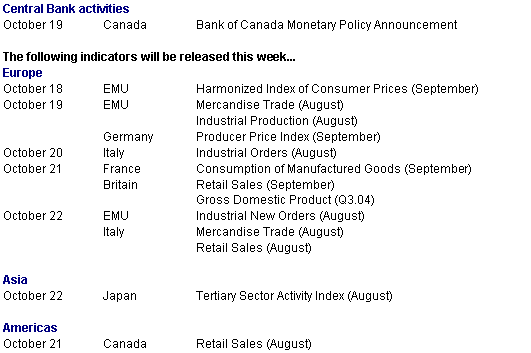Monday, October 18, 2004

Bank of Japan continues on steady path
On Wednesday the Bank of Japan decided for a 12th straight time to keep monetary policy steady to help the country's recovery. It also left its monthly assessment of the economy unchanged. The widely expected decision leaves the central bank's target for liquidity in a range of �30 to �35 trillion ($273.4 to $318.9 billion) as part of the bank's efforts to keep ample cash flowing in the financial system to encourage lending. In its monthly report, the BoJ said the recovery's momentum is getting stronger and it also repeated last month's warning that rising oil prices need to be monitored.

The BoJ, which has kept interest rates at zero for more than three years, has said it will keep easy monetary policy in place until core consumer prices stabilize above zero, which would be an indication that price drops had stopped. The August nationwide core CPI fell 0.2 percent when compared with August 2003.
Energy, mediocre data continue to roil markets
It is crunch time for investors as companies report earnings at an escalating clip. Many have disappointed investors, including GM. Also weighing on investors especially in Britain and Europe was a suit by New York Attorney General Eliot Spitzer against Marsh & McLennan Cos. of the U.S., alleging the world's largest insurance broker took industry payoffs.
Crude and home heating oil futures also depressed investors as cooler weather raised the specter of much higher bills to heat homes in the northern hemisphere, which could in turn crimp consumer and business spending (and profits). Oil prices in New York edged nearer to $55 a barrel as hurricane damage to pipelines and pumps in the Gulf of Mexico were taking longer than expected to repair and were cutting into supplies just before winter.

Of the 13 indexes followed here, the Dow and Nasdaq are down the most year-to-date. The last time they were above their 2003 closing level was on June 23rd - and that was only for that day. Before that, you need to go back to April to find the indexes above their December 31st level. The Dow is down 5 percent while the Nasdaq has dropped 4.6 percent this year. All indexes with the exception of the Australian All Ordinaries and the Mexican Bolsa were down on the week.

Global Stock Market Recap

Europe and Britain
A combination of earnings angst, tepid economic data and oil prices heading north pressured equities lower last week. And on Friday, the scandal surrounding the insurance broker Marsh & McLennan depressed major insurance company shares. European stocks declined, led by insurers including Munich Re and Zurich Financial Services AG, after New York Attorney General Eliot Spitzer sued Marsh of the U.S. alleging the world's largest insurance broker of fraud. Whereas last week all indexes here were higher, this week they gave back all of those gains and much more. A sharp drop in German investor confidence (ZEW) and an unexpected drop in French industrial output in August provided fresh evidence of the loss of momentum at the core of the EMU economy. The data in turn heightened concerns about the lasting impact of high oil prices on global economic growth. All three indexes - FTSE, DAX and CAC - were down on the week, with the FTSE giving ground for 5 straight days.

Asia/Pacific
The only bright spot in the Asia/Pacific indexes followed here was the Australian All Ordinaries. Stocks in Australia celebrated the re-election of Prime Minister John Howard on October 9th in the general election for a fourth term. Job creation and interest rates were the key election issues. Since Howard came to power in 1996, almost 1.4 million jobs have been created and the jobless rate has fallen from 8.2 percent to the current 5.6 percent. But even Down-Under investor confidence eroded through the week as metals prices gyrated and oil prices surged. Australian stocks fell after a plunge in metal prices raised concern that earnings growth may slow at companies such as BHP Billiton and Rio Tinto. Metals fell after Lisbon-based International Copper Study Group said copper consumption in China, the world's biggest copper user, fell 21 percent in July from a year ago. China is expected to say that economic growth in the third quarter slowed to 8.9 percent from 9.6 percent in the second.

Elsewhere in Asia, stocks were down on the week. The Nikkei and Topix dropped for the fifth day on Friday as external events influenced trading. A mix of downbeat corporate and economic news depressed stocks. Investors focused on dropping U.S. stocks, high oil prices, disappointing U.S. earnings and a widening trade deficit.

Currencies
The dollar was pummeled last week by mediocre economic data, especially the ever-rising merchandise trade deficit, along with disappointing earnings and of course increasing oil and heating fuel prices. The dollar was down against the euro, yen, pound sterling, Swiss franc and the Canadian and Australian dollars. The "commodity currencies" - the Canadian and Australian dollars - have been benefiting from the sharp rise in demand for basic commodities. On Friday, the euro briefly soared above $1.25 for the first time since March but then settled in around $1.246.

Indicator scoreboard
EMU - Second quarter gross domestic product growth was confirmed at 0.5 percent and 1.9 percent when compared with the same quarter last year.

Germany - October ZEW economic outlook sentiment among German financial experts dropped for a third month to 31.3 from 38.4 in September. The reasons for the decline were concerns on rising oil prices and signs of slowing global economic growth. The survey is conducted by the Center for European Economic Research (ZEW) in Mannheim. ZEW surveyed 297 German financial experts from September 27th to October 11th for their opinions on current economic conditions and the economic outlook for major industrial economies. The index was below the long-term average of 34.7, signaling a slight downturn in Germany's economy. The anticipated slowdown in German exports is not expected to be offset by rising domestic demand, ZEW added.

France - August seasonally adjusted industrial output sank 1.9 percent but was up 0.7 percent when compared with last year. Manufacturing output was down 2.1 percent and up 0.9 percent on the year. The decline was due to a temporary shutdown of a major auto factory combined with a drop in semi-finished goods production. Auto output plunged 14.4 percent to a four-year low due to "an exceptional and temporary closing" of an assembly plant of a major carmaker during most of the month of August.

August seasonally adjusted merchandise trade deficit was �2.4 billion significantly larger than July's �464 deficit. Exports plummeted 4.2 percent while imports increased by 2.6 percent. Capital goods exports dropped, reflecting weaker demand in Asia and the European Union. Both airbus and auto exports were down.

Italy - August seasonally adjusted industrial output sank 0.8 percent and was down 1.5 percent when compared with last year. All output sectors with the exception of energy goods were down on the month. Eleven of 18 product categories were up on the month with the strongest gains for gasoline refineries, leather & footwear and chemicals.

Britain - September producer output prices were up 0.3 percent and 3.1 percent when compared with last year. Petroleum product prices were up 10.7 percent on the year. Excluding petrol, food, beverages and tobacco, the PPI was up 0.2 percent and 2.2 percent on the year. Producer input prices were up 1.3 percent and 7.3 percent on the year. Crude oil prices were up 2.2 percent and 45.3 percent on the year.

September consumer price index was up 0.1 percent and 1.1 percent when compared with September 2003. Drops in air and sea travel prices pushed prices lower. The Bank of England's inflation target is 2 percent and the CPI remains well below that level. The retail price index excluding mortgage interest payments (RPIX) was up 0.2 percent and 1.9 percent on the year.

August global merchandise trade deficit increased to Stg5.22 billion from Stg4.97 billion July. Imports were up 0.8 percent while exports dropped 0.5 percent. The underlying trade deficit, excluding oil and erratics, widened to Stg5.588 billion from Stg5.126 billion in July. The services surplus edged down slightly to Stg1.265 billion from Stg1.356 billion and the overall trade shortfall in goods and services widened to Stg3.955 billion from Stg3.614 billion.
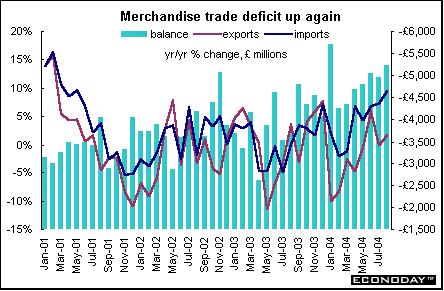
September claimant count unemployment slipped by 200, leaving the claimant count unemployment rate at 2.7 percent for the fourth month. The number of people claiming unemployment benefit fell slightly to 834,000, the lowest since July 1975. Unemployment rate for the three months through August as measured by the International Labour Organization definition was 4.7 percent. Unemployment was down by 51,000.
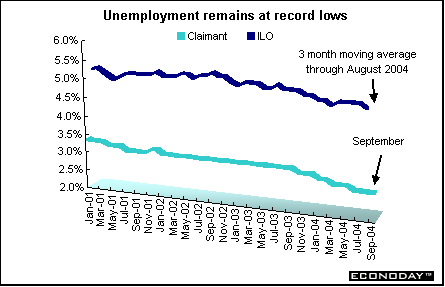
Average earnings for the three months through August was up 3.9 percent when compared with the same three months in 2003. Excluding bonuses, average earnings were up 4.3 percent, the highest rate of increase since April 2002.
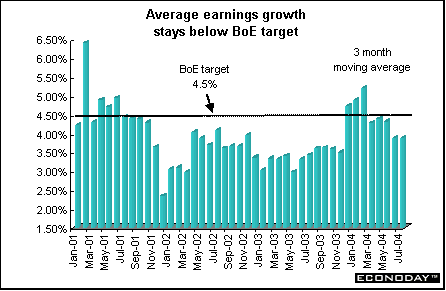
Asia
Japan - August industrial production was revised to an increase of 0.1 percent from the originally reported 0.3 percent. Output of medical devices, plastic-made machinery parts and ticket-vending machines were weaker than the preliminary.
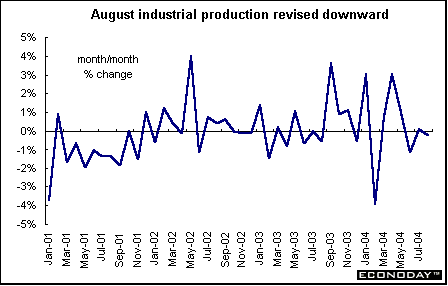
September corporate goods price index, which tracks goods bought by companies and the cost of oil, electricity and other utilities, was up 0.1 percent and 1.8 percent from a year earlier. The increase is due to higher energy prices.
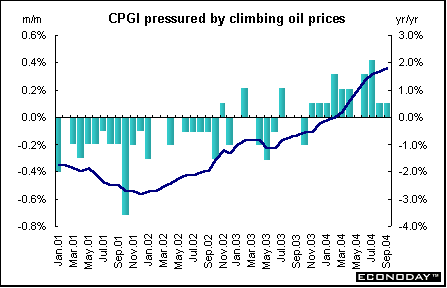
Americas
Canada - August merchandise trade surplus soared to C$7.4 billion. Exports declined 0.4 percent while imports sank by 4.4 percent. Exports to the U.S. dropped 1.1 percent while imports from the U.S. declined by 6.5 percent. This resulted in a C$1.1 billion increase in Canada's trade surplus with the United States to $10.1 billion - only the third time on record that the trade surplus with the United States has topped C$10 billion. Exports to countries other than the United States increased slightly to C$7.0 billion while non-US imports increased 2.1 percent to C$9.7 billion.
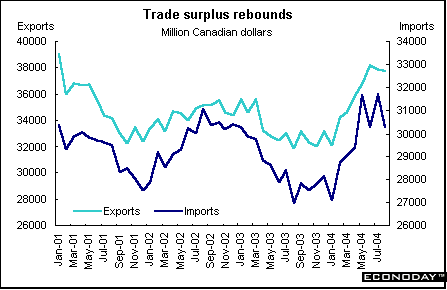
August manufactures' shipments were up 0.8 percent and 17.4 percent when compared with August 2003. Shipments are now up for nine months, the longest string of advances (10) since April 1987 to January 1988. Shipments measured in constant dollars rose 1.5 percent in August, attesting to solid production levels for the month. Durables shipments were up 1.9 percent while nondurables were down 0.4 percent for the first decline in 10 months. Twelve of 21 industries, accounting for 65 percent of total shipments, posted increases in August. Motor vehicle parts shipments jumped 4.8 percent. Shipments of primary metals increased by 2.8 percent. The surge in prices for primary metals, as a result of strong foreign demand in 2004, contributed to yet another record high for shipments. Manufacturers of fabricated metal products boosted shipments by 3.5% to $3.0 billion in August. New orders dropped 1 percent, only the second decrease in the last nine months. Fewer new orders received by the aerospace and motor vehicles industries were largely responsible. The backlog of unfilled orders dropped by 1.1 percent - pulled down by the aerospace products and parts industry. Excluding the aerospace industry, unfilled orders were unchanged.
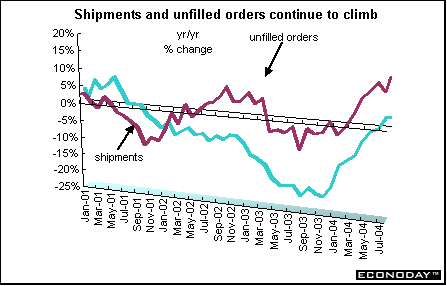
Bottom line
Economic indicators were a mixed bag last week and made it difficult to pick out a discernable trend. Disappointing data in Germany and France combined with a miserable U.S. merchandise trade were offset by benign producer price increases and a favorable retail sales report in the United States. Equities were weighed down first by ever climbing energy prices, crumbling metals prices due to weak Chinese demand and - at week's end - the impact of the Marsh suit on insurance stocks especially in Europe. Earnings also alternately relieved and depressed investors.
The Bank of Canada announces its latest monetary policy decision on Tuesday. The soaring merchandise trade surplus along with climbing manufacturing data indicates that Canada is growing at the fastest pace in more than two years. The bank's September 8th 25 basis point rate increase to 2.25 percent was the first in 17 months, and recent bank rhetoric suggests they will continue to increase rates.
Looking Ahead: October 18 through October 22, 2004
